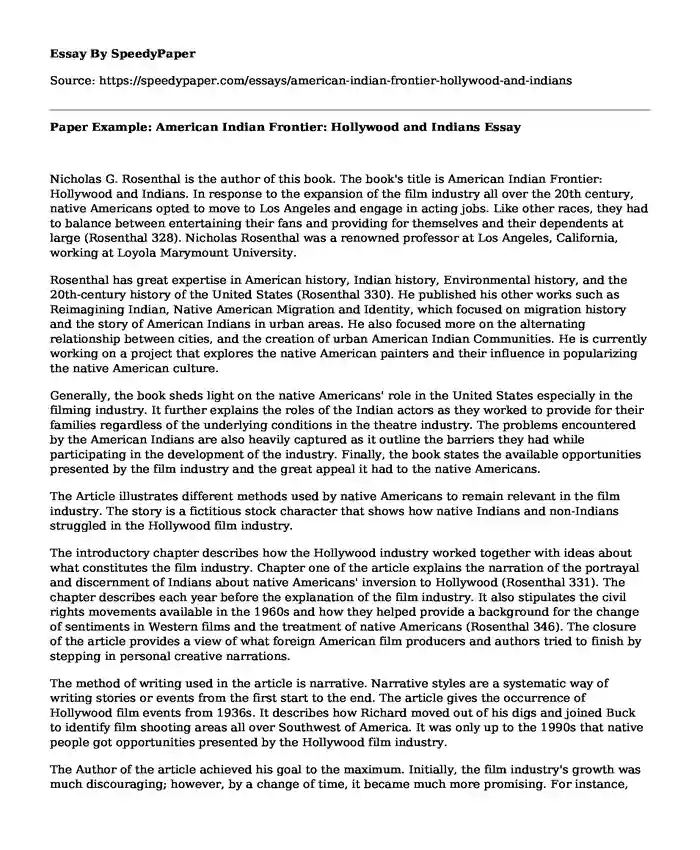
| Essay type: | Rhetorical analysis essays |
| Categories: | Movie Community American history American culture |
| Pages: | 3 |
| Wordcount: | 650 words |
Nicholas G. Rosenthal is the author of this book. The book's title is American Indian Frontier: Hollywood and Indians. In response to the expansion of the film industry all over the 20th century, native Americans opted to move to Los Angeles and engage in acting jobs. Like other races, they had to balance between entertaining their fans and providing for themselves and their dependents at large (Rosenthal 328). Nicholas Rosenthal was a renowned professor at Los Angeles, California, working at Loyola Marymount University.
Rosenthal has great expertise in American history, Indian history, Environmental history, and the 20th-century history of the United States (Rosenthal 330). He published his other works such as Reimagining Indian, Native American Migration and Identity, which focused on migration history and the story of American Indians in urban areas. He also focused more on the alternating relationship between cities, and the creation of urban American Indian Communities. He is currently working on a project that explores the native American painters and their influence in popularizing the native American culture.
Generally, the book sheds light on the native Americans' role in the United States especially in the filming industry. It further explains the roles of the Indian actors as they worked to provide for their families regardless of the underlying conditions in the theatre industry. The problems encountered by the American Indians are also heavily captured as it outline the barriers they had while participating in the development of the industry. Finally, the book states the available opportunities presented by the film industry and the great appeal it had to the native Americans.
The Article illustrates different methods used by native Americans to remain relevant in the film industry. The story is a fictitious stock character that shows how native Indians and non-Indians struggled in the Hollywood film industry.
The introductory chapter describes how the Hollywood industry worked together with ideas about what constitutes the film industry. Chapter one of the article explains the narration of the portrayal and discernment of Indians about native Americans' inversion to Hollywood (Rosenthal 331). The chapter describes each year before the explanation of the film industry. It also stipulates the civil rights movements available in the 1960s and how they helped provide a background for the change of sentiments in Western films and the treatment of native Americans (Rosenthal 346). The closure of the article provides a view of what foreign American film producers and authors tried to finish by stepping in personal creative narrations.
The method of writing used in the article is narrative. Narrative styles are a systematic way of writing stories or events from the first start to the end. The article gives the occurrence of Hollywood film events from 1936s. It describes how Richard moved out of his digs and joined Buck to identify film shooting areas all over Southwest of America. It was only up to the 1990s that native people got opportunities presented by the Hollywood film industry.
The Author of the article achieved his goal to the maximum. Initially, the film industry's growth was much discouraging; however, by a change of time, it became much more promising. For instance, native Americans shifted to Los Angeles, California, to search for jobs in the film industry in the early years of the twentieth century. Like other Foreigners, they maintained the problems of performing to a popular crowd with a mindset of getting money to cater to the personal needs and needs of their families. The work concludes with a view of what American Indians film producers and authors try to accomplish by standing with their narrations. It is a clear view of how the Article is relevant (Rosenthal 350).
I would recommend this Article to interested readers or scholars. The article is a clear representation of how people can make money through story-telling.
Work Cited
Rosenthal, Nicolas G. "Representing Indians: Native American Actors on Hollywood's Frontier." Western Historical Quarterly 36.3 (2005): 328-352.
Cite this page
Paper Example: American Indian Frontier: Hollywood and Indians. (2023, Oct 24). Retrieved from https://speedypaper.com/essays/american-indian-frontier-hollywood-and-indians
Request Removal
If you are the original author of this essay and no longer wish to have it published on the SpeedyPaper website, please click below to request its removal:
- Essay Sample on the Movie Depression: Out of the Shadows
- Bridegroom (2013) Movie Review, Free Essay for Everyone
- Console vs. PC Gaming - Free Essay on Video Games
- Free Essay Example. Build Up of America
- DateThe Propaganda Model
- Free Essay. Forensic Anthropology- Season 11 Episode 5: Bones: Resurrection in Remains
- Segregation in America - Essay Sample
Popular categories




